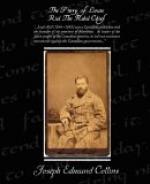The general advance began at 11.45 a.m., Major Buchan of the 90th leading the right wing, and Major Boswell of the same corps the left. When the rebels saw this a number of them rushed forward on the left of the ravine, and the fighting for a time was carried on at close quarters, the enemy not being over sixty yards away. An old log hut and a number of barricades, formed by placing old trees and brushwood between the boulders, enabled them to make it exceedingly warm for our men for a time. At this point several of the 90th were wounded, and General Middleton himself had a narrow escape, a bullet going through his fur hat. Captains Wise and Doucet, of Montreal, the General’s Aide-de-camps, were wounded about this time. “C” infantry behaved remarkably well all through, and bore the brunt of the general advance for some time, the buckshot from the rebels doing much damage. The rebel front was soon driven back, but neither here nor at any other time could the rebels’ loss be ascertained. The Indians among them, who were armed with guns, appeared to devote themselves mainly to shooting the horses. A good many Indians were hit, and every time one of them was struck the others near him raised a loud shout, as if cheering. The troops pressed on gallantly, and the rebel fire slackened, and after a time died away, though now and then their front riflemen made a splurge, while the others made their way back. Captain Forrest, of the 90th, headed the advance at this point, Lieutenant Hugh J. Macdonald (son of Sir John Macdonald), of this company, who had done excellent service all day, kept well up with Forrest, the two being ahead of their men, and coming in for a fair share of attention from the retreating rebels. Macdonald was first reported as killed and then as wounded, but he was not injured, though struck on the shoulder by spent buckshot. Forrest’s hat was shot off. At 12.50 the rebels were far out of range, going towards Batoche’s, and the Battle of Fish Creek was practically over. [Footnote: I am chiefly indebted to the Toronto Mail for the foregoing account of the battle.]
During the battle, many instances of the greatest bravery are recorded. Private Ainsworth, of the 90th, was seen to leap upon the shoulders of a savage, who, in company with another, had endeavoured to cross the flat land and get shelter, wresting his gun and felling him to the earth with the butt of it, then securing the rifle firing at and killing the other Indian. While doing this, he was exposed to the fire of a score of guns, getting riddled with buck-shot and being struck with bullets. But the greatest daring and bravery were exhibited by Watson, of the Toronto School of Infantry. Finding it impossible to dislodge the enemy, he rushed headlong for the ambuscaded half-breeds, followed by a score of his comrades whom it was impossible to control. The war-cries of the Indians, the huzzas of the troops, and the rattle of musketry fairly echoed for miles, as evidenced by the statements of the west side contingent upon arriving on the scene. Watson paid the penalty of his daring by death, while the narrow escape of many others were remarkable. The utmost bravery all the while was displayed by our troops. When a man fell his comrade would pause for a moment, and say:




